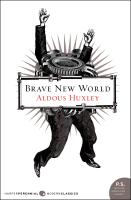
Brave New World, an iconic dystopian novel by Aldous Huxley has been called prophetic
for its striking predictions of the future—a future that our society seems to be approaching. Gone
are the notions of love and connections; humans are bred in labs for specific societal roles,
citizens are told to pursue relationships with multiple people solely for pleasure, and the
totalitarian government controls the populace via soma, a dangerous drug with seemingly no side
effects.
The novel follows Bernarnd Marx—a member of the alpha caste that dominates society,
with a birth defect causing his stature to better resemble a gamma or epsilon servant—and
Lenina, a perfect representation of the problems with society in Brave New World. She is blindly
addicted to technology and soma, only pursues relationships for sexual pleasure, and lacks any
form of critical thinking skills. The duo travels to a reservation and meet John, a “savage” whose
mother was born in the futuristic London society, thus his ideals based on historical literature and
traditional ways often clash with those who are considered to be “civilized.”
Brave New World is an astoundingly relevant story whose appeal seems to strengthen as
time passes; its portrayal of media and hedonist principles are particularly important in the
modern world of instant gratification and technological addiction. It may lack modern style
action and character development, but the philosophical and political implications hidden among
the pages make it worthwhile for most people to read this classic novel at least once in their
lives; therefore, it deserves a 5/5 rating.
